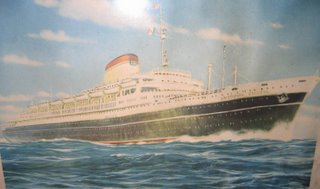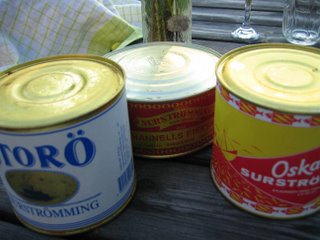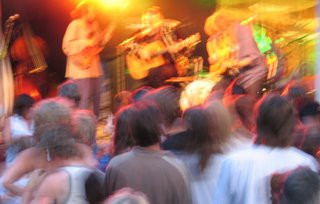Thursday, August 31, 2006
 End of summer
End of summerIt is still warm and the butterflies are swarming in the garden - admiral, peacock butterfly, and tortoiseshell. The admiral is a migrant butterfly. They fly here in spring, lay eggs on nettle plants but (so far) can't survive the winter at our latitude. So the newly hatched butterflies have to migrate back to continental Europe or perish in the cold. Our white clematis appears to be a favorite plant for feeding.
 Patagonia, 1975
Patagonia, 1975The Englishman I shared hotel with is unbearable. Keeps talking all the time. He said he wants to be an author. I find that utterly unlikely to succeed. He has, apart from some newspaper writing, only worked with antiquities so far and says he was successful at that. Why then leave an apparently well-paid job and go to South America just to try to get famous?
He had actually been in Sweden once when he was a boy some twenty years ago, to train a couple of kids in English. His only friend there had turned out to be an old eccentric, no wonder.
He doesn’t understand anything of Argentine politics. This is definitely going to get him into trouble. Apparently it was close already the other day when he started to argue with some policemen. He also annoys most of the locals and he hardly speaks any Spanish. He seems mostly to talk about his ancestors of which he claims that one had sailed to Patagonia. He tries to follow the footsteps of that old fart and other Brits... A strange thing to do in a country on the verge of a military coup.
If he wants to write, why not try to alarm good old England and the rest of the world about young presumed leftists and montonero peronistas who keep disappearing and turn up dead and mutilated by so-called paramilitary groups?
(No, this is not a true story but could well have been, with some weeks difference)
Wednesday, August 23, 2006

Francisco Roca made a musical interpretation of the García Lorca poem La Guitarra on a fine LP from 1977 where he otherwise mostly sings Violeta Parra.
Empieza el llanto
de la guitarra.
Se rompen las copas
de la madrugada.
---
Llora por cosas lejanas
Arena del Sur caliente
Que pide camelias blancas.
Llora flecha sin blanco,
la tarde sin mañana,
y el primer pajaro muerto
sobre la rama
O guitarra!
Corazon malherido
por cinco espadas
This song is very emotional, maybe more so than melodious. I believe it catches a lot of the sentiment in the poem, which partly deals with the war.
I first saw Francisco Roca appear with his group Atacama at a music festival in Uppsala, probably in 1971. At this time, Latin American music with charango, zampoña and drum was not so common as it is now with an Andean group playing in every town square. The audience felt this was something new and exiting. Francisco has since become an institution for Latin American culture in Sweden, working in music, film and writing.
Tuesday, August 22, 2006
 The passing of decades. Remembering García Lorca.
The passing of decades. Remembering García Lorca.When the Cristoforo Colombo came into Lissabon November 1975, it was a time of revolutionary worker manifestations there. On this particular day, we joined the largest demonstration I have ever seen, with the whole city full of workers with helmets, waving red flags. The march was, we understood, heading for the Governmental Palace, where the flag was at half the pole. The reason was that Generalissimo Francisco Franco of Spain just had died. The masses demanded that the flag should be raised to the top of the pole, which of course did not happen.
Almost 40 years before, in the summer of 1936, that is exactly 70 years from now, the same Franco had started the Spanish Civil War and his Guardia Civil was cleansing the country from unwanted elements. One of these was the poet and playwright Federico García Lorca, who became an early victim (August 19) of the falangistas because he did not want to leave his country. Thank you Swedish Radio 1, for remembering this, and broadcasting plays by, and about him.
It is a strange coincident, that the same week this year as this anniversary, one of Franco's contemporaries and alikes, Alfredo Stroessner, blood-handed dictator of Paraguay 1954-1989, passed away (August 16).
Photo of García Lorca - SVT Bild.
 Crossing trails
Crossing trailsI don't travel at all as much as many people I know. Still I have some experiences of when different journeys cross their trails. We had a fish dinner at a hotel in Porto Cesarea, Puglia, this April, when I noticed a picture of a ship over our table. I realised that I had borded that ship 30 years and a half ago in Genua for Buenos Aires.
I spent more than two weeks on the Cristoforo Colombo eating Italian food and talking, listening to music, and maybe, dancing. I remember the Argentinian couple who we later were to spend a lot of time with, and the basque guy who went to Argentina to get some peace from political turmoil (three months before the military coup!). Also, we stopped in harbours, beginning with Barcelona, Lissabon and Santa Cruz de Tenerife so we could spend the day there.
Monday, August 21, 2006
 Sour Fish 6 - The Economy
Sour Fish 6 - The EconomyA normal year, 1.4 million cans of sour herring leave the Swedish salteries. This year, due to the small herring harvest, only 800 000 cans have been produced, according to Ruben Madsen, president of the Sour Herring Academy, interviewed in Dagens Industri on August 17. Considering that the price is 40-50 SEK per can, this still means a turnover of maybe 40 million SEK. This is not as much as the estimate of the North Swedish vendace roe production - 100 million SEK, for 80 tonnes of roe (DI August 14).
However, with the sour herring sales, there is also a market for thin crisp bread, potatoes, onions, sour cream and tomatoes at a value of 350 SEK to go with each can - a total of 320 million SEK for the fish parties. And then we haven't even counted the beer and booze....
Picture from the Sour Herring Academy.
Monday, August 14, 2006

The other evening we tried three popular brands of sour herring, all from different provinces. All cans were last years herring, which is usually preferred by fermentation connoisseurs. All brands were fine but our judgements differed. My own opinion was that Oskars and Hannells were very even in taste and Storö was a little bit behind.
But what will happen to our delicacy in the future? According to Jan Söderström, chairman of the fish salting industries in Norrland, interviewed in Dagens Industry on July 7, the catches of herring have been halved in two years. - Finnish trawlers fishing for mink food take all little fish, he said, preventing herring from growing up.
Sunday, August 13, 2006

This official year of diversity in Sweden the Urkult festival decided, maybe as a bit of provocation, to almost only book artists from the Nordic countries. Nevertheless, they have their roots in thirty different countries. On Saturday of the festival, you could listen to Senegalese Galaxy from Finland, Andra Generationen from Sweden with Turkish and Romani music, etc., and 20-yr-celebrating Baba Blues, on the photo.
A personal highlight on Saturday was taking part of the three-hour chanting workshop of Amina Annabi, where I learned that I actually could hold a tone steadily for more than a few seconds. Yes, this was the same Amina who should have won the Eurovision Song Contest in 1991, and almost did so, instead of a certain Swedish singer....now a steadily returning Urkult fan.
 The virtual made real
The virtual made real- only by clowns!
Cirkus Urkus, Sirqus Alfon and Clowns Without Borders made great shows, tricks and music during the festival. They also made the seemingly impossible - perform a jump in slow motion - in reality. At least this is what we believed we saw. This happened at Urkult festival, on the Friday. The profits from the festival this year go to Clowns Without Borders who travel to refugee camps all over the world and make life a little happier for the children.
 Fire night in the north
Fire night in the northThe now traditional fiery first night, Thursday, of the best festival of all, Urkult , was this year created by the "international fire theatre wizard" David Eveleigh. It was just amazing and a suitable inauguration of the festival. The night was almost chilly so the fire helped warming - until the firebrigade came and put it out so the band could play safely.
Tuesday, August 01, 2006
 Sofia is also for real
Sofia is also for realAt the island song festival, maybe the finest appearance was that of Sofia Karlsson and her musicians. Their interpretations of songs by poet Dan Andersson and beloved songwriter Olle Adolphson made the audience' feelings swing between sorrow and happiness. The intimacy of a small stage and closeness between performers and listeners create great meetings.
Dan Andersson's songs are just almost too romantic and sentimental, and we cry to them everytime. In particular when they are sung and accompanied so beatifully. Maybe you think his songs are too much tied to memories from the remote forests in Sweden's early 1900's? No, they have a potential of moving people all over the world.
As just one example, here is the Spanish version of the beginning of "Tiggarn från Luossa", translated by Kiko del Paraguay (Pompeyo Lugo Méndez), who learned about Dan Andersson in Sweden and still works with his material after 17 years back in South America. Reality for poor forest people in Paraguay today is close to the stories in the poems.
"En los cerros de Luossa en una noche de sol, los humildes aldeanos oyen a un mendigo cantar, de mendigos, caminantes, ilusiones y de sueños, y de su melancolía toda la noche cantó."
Just by chance, I find that Kiko is actually playing at the Dan Andersson Festival in Ludvika in Dalarna, and receiving the Dan Andersson price, on this very Tuesday! I hope Sofia will be there! At least she will play there on Saturday...